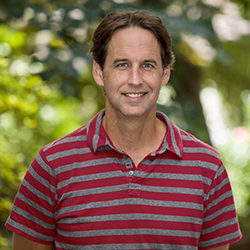January 30, 2018
By AMANDA POPE
Staff reporter

Ryerson journalism professor Gavin Adamson is part of a team that will be sharing best practices for reporting on mental health issues with researchers in Mexico and Chile.
The Canadian researchers were recently awarded a $20,000 Canadian Institutes of Health grant for the project Reducing Mental Illness Stigma in Latin America: Dissemination and Planning, which aims to counter negative perceptions of mental illness created by the news media.
Adamson, a co-investigator on the project, will be overseeing production and research in Toronto and working alongside his long-time research collaborator Robert Whitley, an assistant professor of psychiatry at McGill University. Whitley, who has been examining reporting on mental illness by the Canadian news media since 2005, has noted improvements in the coverage. He has produced the Mindset Guide on best practices for reporting on mental illness and an online course for journalists. The two initiatives, dubbed the “Canadian Model, ” explore how the news media contributes to negative impressions of people with a mental illness and provide tips for journalists on best practices for covering the issue.
Adamson, who will contribute expertise in media engagement and mental health journalism to the project, says evidence suggests that the guide has significantly improved the coverage around suicide reporting in Canada: “The coverage has focused less frequently on suicide methods and on blaming the affected people. Instead it has focused more on challenges around treating mental illness and identifying potential social supports.”
The result, he said, is reporting on mental illness by Canadian journalists that is much more sensitive, accurate and positive. Whitley’s research, for instance, has found that the number of newspaper articles about mental illness that are positive in tone almost doubled from 2005 to 2015, while the number of stories containing stigmatizing language fell by a third.
His research also suggests that stigma associated with mental health is high in Latin America, and that resources are not readily available for national anti-stigma campaigns. With the Canadian Institutes of Health Research grant, Whitley and the research team will travel to Santiago, Mexico and Concepción, Chile to present the Canadian Model to researchers.
“We’ll be able to describe previous Canadian action research that shows how helpful it can be to work with the media and with stakeholder organizations in addressing stigma rather than just analyzing text and identifying problems,” said Adamson.
Adamson said the Canadians the results of their Recovery Advocacy Documentary Action Research (RADAR) with their Latin American counterparts. RADAR provides people who have with mental illnesses the training and resources to create their own documentary films. The goal was to see if such videos challenge traditional media stereotypes about people who are mentally ill.
“In our research, people recovering from mental illness describe their own stories about their experiences by producing their own video,” Adamson said. “They describe the challenges they’ve had navigating the Canadian health system, for example, or challenges with social support systems, their experiences with recovery or with the police. The act of getting involved in telling their own stories may help.”
In addition to Adamson and Whitley, the research team includes scholars from Columbia University in New York and from universities and research institutes in Chile and Mexico.
Columbia University’s Franco Mascayano, a collaborator on the grant, conducted a systematic review of research papers and concluded that negative attitudes and prejudices toward mental disorders are prevalent in Latin America and that little has been done to address the problem.

“There is still a lack of resources for research,” said Whitley, who is leading the project. “The economies are improving but almost all countries in Latin America have an unstable economy. Over the past 10 or 20 years, these countries who were formerly dictatorships, have become democracies so the economy has improved incredibly and there is more freedom and money available in universities to do research on topics such as mental illness.”
Given this situation, Whitley says, the Canadian team will meet with mental health researchers and mental illness service-users in Mexico and Chile to outline what has been done in Canada and to hear from his Latin American counterparts as well: “I will listen to what they think about it– this will be a listening exercise. I do have something to contribute as I have done this study [in Canada] since 2005 but [Mexico and Chile] have a lot to contribute as well.”
Whitley will produce a research document that reviews past research related to mental illness, suggests initiatives aimed at reducing stigma in Mexico and Chile and discusses possible research questions and timelines.
The team will then lead a two-day workshop in Montreal to develop a research strategy and a focused plan to improve coverage of mental health issues by the media in the two countries.
Mexico and Chile were chosen for the project as they both have high rates of literacy, freedom of the press and widely-consumed media “Chile is one of the most developed countries and Mexico is moving up there but is less developed. We chose these countries because we saw opportunity,” Whitley said.
